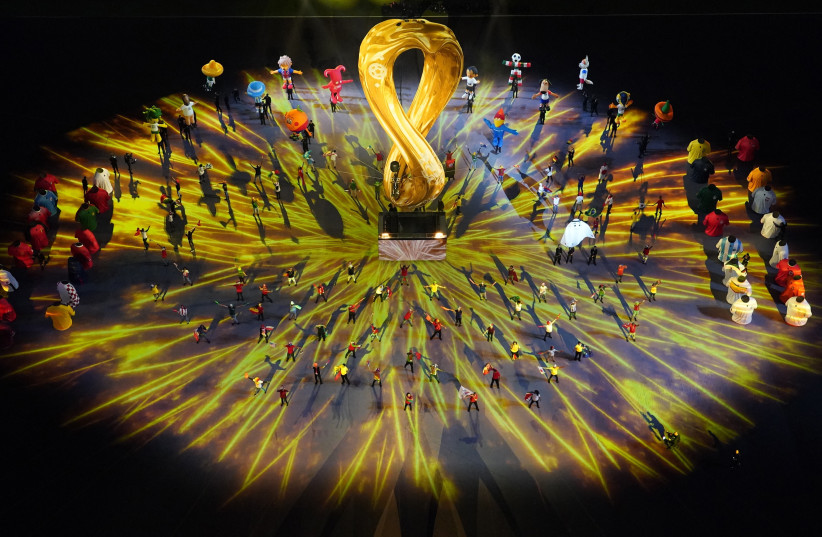The epic final of the World Cup between Argentina and France has prompted claims that this was one of the best World Cup finals in recent memory. The Qatari hosts appear to have regained some of the spotlight that was marred by how the event came about.
Even France obliged. On Thursday, an article at Agence France-Presse noted, “President Emmanuel Macron on Thursday stood by his decision to travel to Qatar to support France’s World Cup team, despite allegations linking the Gulf monarchy to corruption in the European Parliament.”
The turnout and enthusiasm for the final match showed that while many threatened to boycott the World Cup, the beautiful game brought them back.
Nevertheless, Qatar has not escaped criticism. It appeared to crack down on Iranian dissidents and Pride flags, and it tried to deflect criticism of gay rights by arguing that Western critics were racists who were anti-Qatar or anti-Arab.

There was also controversy over migrant deaths linked to the construction of the World Cup stadium. A last-minute decision to ban serving beer led to criticism. And the death of two senior sports journalists also raised eyebrows, even though health experts said the deaths were natural.
If Qatar thought it was entirely out of the woods, it then had to deal with another growing scandal in the European Union involving accusations of bribery of members of the European Parliament. However, with the world’s eyes on the final game, no one was thinking of this dark cloud.
Hosting the game enabled Qatari officials to mingle with important politicians – world leaders like Macron – as well as celebrities and business people from around the world. Photos posted online showed Elon Musk and others at the game, while Turkish media said Turkish President Recep Tayyip Erdogan, a close ally of Qatar, was at the final as well.
All of this matters to Doha.
While Qatar may continue to see criticism coming from the West, hosting the event has been fairly smooth. This prompted congratulations from other Gulf states, including ones that have recently been critical of Doha.
Qatar brought the spotlight to the Gulf and the region, and many feel the net positive from that. This includes Morocco’s wins, which many felt inspired the Arab and Muslim world at large. Displays of Palestinian flags, even as other flags and symbols were suppressed at the event, showcased how nationalism and regional causes shine through the universality of sports.
SO, QATAR ended this feat on a high note, one that it will have to work to convert to a longer-term success. However, it still holds immense power through media networks and think tanks, as well as likely partnerships with big tech companies.
Qatar’s success also shows that Western criticism about issues like workers’ rights and gay rights may turn out to be more virtue-signaling than anything else, and may not carry real implications.
“Human rights” and “democracy” are issues about which many Western countries issue verbal criticisms, but historically, the West has partnered with dictatorships abroad and even with far-right extremist regimes.
For instance, Turkey is a country led by a far-right religious extremist and a regime that is crushing democracy, yet is a member of NATO. In fact, Turkey has made it hard for democracies like Finland and Sweden to join the alliance.
While the West talks about democracy, it often outsources its security to regimes like Turkey. This is why Qatar, Pakistan and many other regimes are key Western partners. For instance, historically, the US preferred to partner with Pakistan rather than India – a policy that changed only recently. Pakistan backed the Taliban and hosted extremists linked to al-Qaeda in the 1990s, yet this was a US partner. Countries that convict people of “blasphemy” are often partners of the “democracy” supporting the West.
There have been recent moves by the West to stand up to Russia and Iran on issues relating to human rights and women’s rights. However, this does not extend to standing up to historic Western partners on these issues.
That means that whereas there was some critique of Qatar about worker’s rights, there was no attempt to prevent it from hosting the World Cup and force reforms. In other words, Doha and other countries can generally rest assured that this was more about talk, and when all is said and done, if a country can pull off an event successfully and without local protests or significant problems, it will have succeeded.
This is the general model for how sporting events – or even Western academic institutions, museums and businesses – have found partnerships abroad.
The West prefers stability and an aura of peace along with some lip service to the things it claims to care about. Whether worker’s rights, women rights or gay rights improve, tends to be of secondary importance when it comes to state-to-state relations and international events. All Doha had to do was appear to be doing the right thing and not use an openly authoritarian hand. And it largely succeeded.
